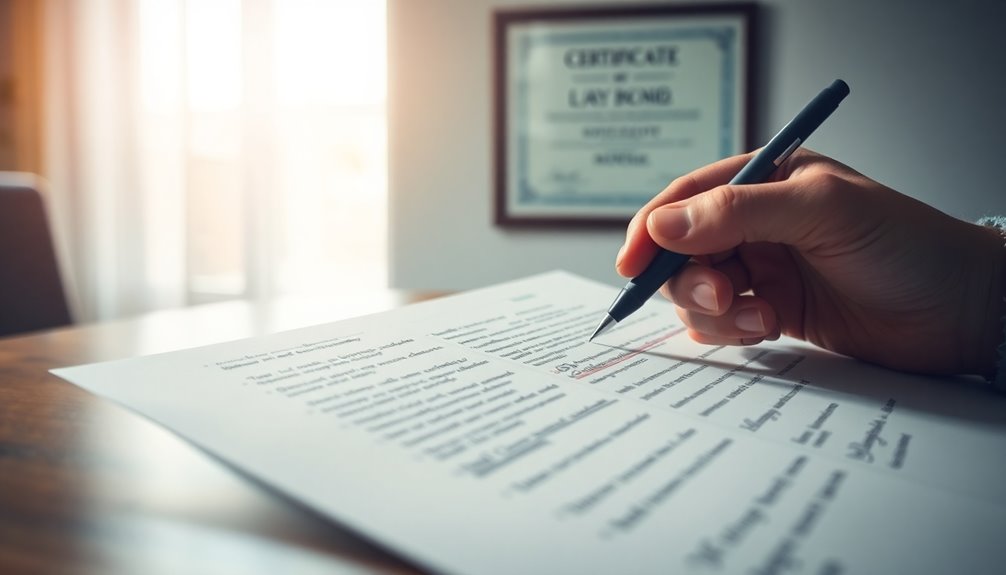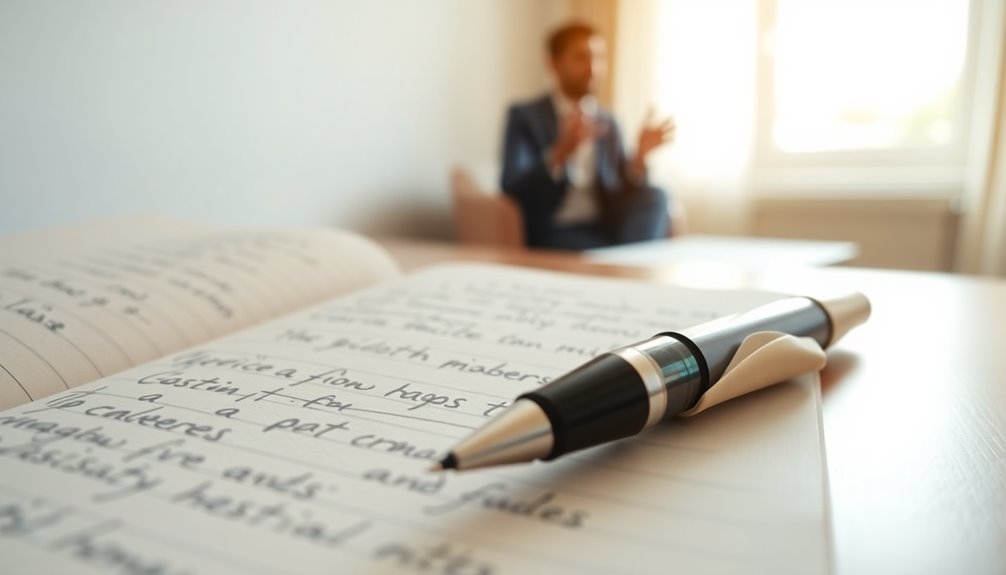Mastering how to talk about your mistakes in an interview can set you apart. You need to understand that interviewers want to see accountability and learning. Start by choosing a minor, fixable mistake that's relevant to the job. Own up to it completely and explain how you resolved the issue. Highlight positive outcomes, showing your ability to grow and adapt. This approach not only demonstrates your integrity but also showcases your emotional intelligence and critical thinking. There's more to uncover about how to effectively communicate your insights and strength in overcoming challenges.
Key Takeaways
- Acknowledge your mistakes openly to demonstrate integrity and self-awareness during interviews.
- Choose minor, fixable work-related mistakes that showcase your ability to learn and grow.
- Clearly outline the mistake, taking full accountability and avoiding blame on others.
- Describe specific actions taken to resolve the issue and prevent future occurrences.
- Highlight positive outcomes from your corrective measures to emphasize growth and resilience.
Understanding the Question's Intent

When interviewers ask about your mistakes, what're they really trying to learn? They want to assess how you handle challenging situations and see if you can admit to your errors with integrity.
This question provides you with an opportunity to showcase your thought process, reflecting on your experiences. Interviewers are also evaluating your emotional intelligence and critical thinking skills, gauging how well you can analyze a situation and take responsibility for your actions.
They're interested in your accountability and whether you've learned from past experiences. Ultimately, they're looking for signs that you can grow professionally and contribute positively to their team, making this question a key insight into your character and capabilities.
Crafting Your Response

Crafting a response to questions about mistakes requires a strategic approach. Start by outlining the mistake clearly and concisely, ensuring you take full accountability.
Next, describe the actions you took to resolve the issue, emphasizing any positive outcomes from your corrective measures.
Highlight what you learned from the experience and how you plan to apply these lessons in the future. This not only demonstrates your ability to reflect but also your commitment to growth. Additionally, showcasing your ability to demonstrate emotional intelligence will further impress potential employers.
Keep your response focused and relevant to the role you're applying for, tailoring your example to fit the job's context.
Finally, anticipate follow-up questions so you're prepared to reinforce your accountability and showcase your problem-solving skills effectively.
Identifying the Right Mistake

Identifying the right mistake to discuss in an interview is essential for making a positive impression. You want to choose a mistake that's minor yet relevant to your professional life. Avoid discussing personal errors; focus on work-related situations that allow you to showcase your growth.
Here's a helpful table to guide your choice:
| Criteria | Examples |
|---|---|
| Minor and Fixable | Missed deadline on a project |
| Shows Responsibility | Miscommunication with a team member |
| Emphasizes Learning | Ineffective presentation skills |
| Relevant to Desired Role | Error in data analysis |
Selecting the right mistake can illustrate your ability to learn and improve, making you a stronger candidate. Additionally, understanding technical SEO can enhance your ability to analyze and correct mistakes in your work.
Demonstrating Accountability

Demonstrating Accountability
Selecting the right mistake is just the beginning; demonstrating accountability is what truly sets you apart in an interview. When you own up to your error, you show integrity and maturity, qualities that employers value.
Acknowledge what went wrong and take full responsibility without deflecting blame. This honesty not only builds trust but also showcases your willingness to learn. Clearly outline the actions you took to rectify the situation and emphasize the positive outcomes that followed.
Discuss how the experience influenced your future decisions, illustrating your commitment to personal growth. Remember, accountability isn't just about admitting faults; it's about showing that you can turn mistakes into valuable lessons. Additionally, this approach mirrors the concept of emotional dysregulation, highlighting your ability to manage and learn from challenging situations.
This approach will leave a lasting impression on your interviewer.
Preparing Real-Life Examples

When preparing real-life examples for your interview, it's essential to choose three to five specific instances that highlight your ability to learn from mistakes.
These examples should showcase your growth and problem-solving skills. Here's how to structure them:
- Identify the Mistake: Clearly outline what went wrong and why it mattered.
- Take Action: Describe the steps you took to rectify the situation and make sure it wouldn't happen again.
- Highlight Results: Emphasize the positive outcomes that arose from your corrective actions.
- Reflect: Discuss the lessons learned and how they've shaped your approach moving forward. Additionally, consider how your experiences relate to financial misconduct as it can provide valuable insights into accountability and growth.
Frequently Asked Questions
How Can I Choose the Right Mistake to Discuss?
When choosing the right mistake to discuss, focus on a minor, fixable work-related error. It should be something you can take full accountability for.
Think about mistakes that led to significant learning experiences or professional growth. Avoid personal situations, and guarantee the mistake demonstrates your problem-solving skills.
Emphasize how you resolved the issue and the positive outcomes that followed, highlighting what you learned and how you'll apply those lessons in the future.
What Tone Should I Use When Describing My Mistake?
Imagine you're a captain steering a ship through turbulent waters. When discussing your mistake, keep a tone that's calm and reflective, like a sailor recounting a storm.
You're owning your error, so don't shy away from honesty. Use a constructive tone, focusing on lessons learned and how you've grown.
This shows maturity and emotional intelligence, making your story resonate with your audience, turning turbulence into a valuable learning experience they can appreciate.
Should I Practice My Response Aloud or Just Mentally?
You should definitely practice your response aloud. Speaking your answer helps you become more comfortable with the wording and flow.
It also allows you to identify any awkward phrases or areas where you might stumble. Plus, vocalizing your thoughts can enhance your confidence during the interview.
Don't forget to time yourself to guarantee you stay concise and focused. Practicing in front of a mirror or with a friend can be really beneficial, too.
How Long Should My Answer About the Mistake Be?
Did you know that 70% of employers value honesty over perfection in interviews?
When answering about a mistake, aim for about two to three minutes. Keep it concise but thorough; outline the mistake, your actions, and what you learned.
This timeframe lets you show reflection and accountability without rambling. Practice your delivery to guarantee you're clear and impactful while staying within that time limit.
Can I Mention Mistakes From Previous Internships?
Yes, you can mention mistakes from previous internships. These experiences often provide valuable lessons and show your growth.
Just make sure to focus on minor, fixable errors and take full responsibility for them. Highlight how you resolved the issues and what you learned in the process.
This illustrates your accountability and ability to reflect, which are important qualities in any role. Keep it professional and relevant to the position you're applying for.
Conclusion
Embracing your mistakes isn't just a strategy; it's a superpower that transforms you into an unstoppable force in any interview! By deftly steering through your past blunders, you turn potential disasters into dazzling tales of growth and resilience. Remember, every misstep is merely a stepping stone on your path to greatness. So, when you face that question about a mistake, release your inner hero and watch how it captivates your audience, solidifying your place as the ideal candidate!









